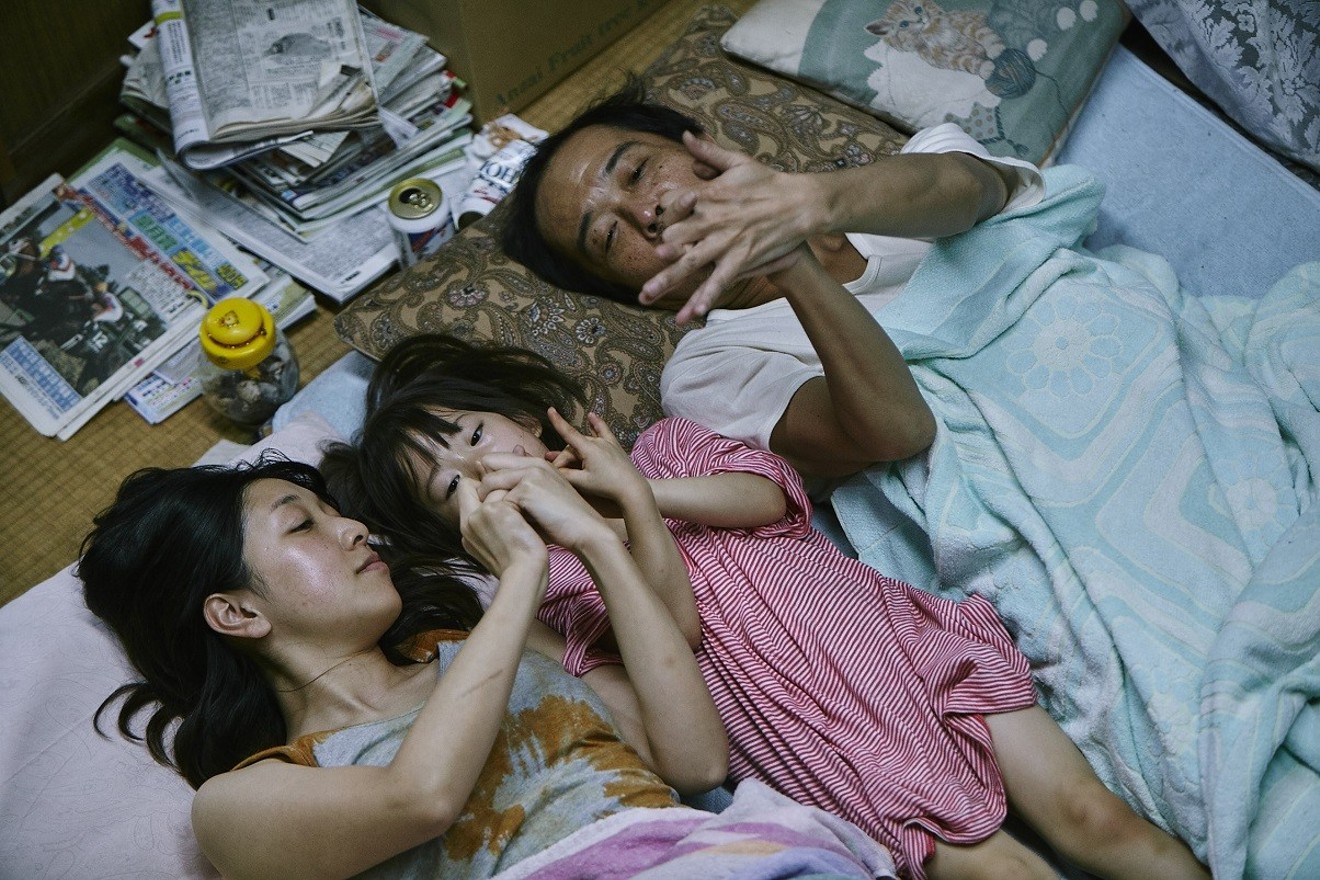Japanese director Hirokazu Kore-eda is fascinated by the forces that shape families — be those families biological, estranged, surrogate or even just symbolic. In Shoplifters, which won the Palme d’Or at this year’s Cannes Film Festival, he has found one of his most intriguing subjects to date. Based on a collection of true news items about exactly what the film’s title promises, Kore-eda’s story centers around a household that at first might appear to be a somewhat ordinary family that has merely fallen on hard times. The father, Osamu (Lily Franky), works as a day laborer, but he and his young son Shota (Kairi Jo) still have to pilfer groceries from the supermarket to survive. Ditto Osamu’s wife Nobuyo (Sakura Ando), who works at a bar, and her sister Aki (Mayu Matsuoka), who works at a peep show dressing up as a schoolgirl. The whole family works, and steals, except for grandmother Hatsue (Kirin Kiki), in whose crowded, tiny shack they all live illegally. She subsists on a meager pension.
But gradually, through offhand comments and occasionally surprising actions, the connections between these individuals start to seem a lot less certain. Are Osamu and Shota, who like to bond over their smooth, well-coordinated shoplifting forays, actually father and son? Is there a darker past between Osamu and Nobuyo, who seem so affectionate and tender toward each other? And just exactly whose grandmother is that? Kore-eda eases us into this loving arrangement on the margins of society and then slowly, subtly undoes every assumption we might have made about these people.
We get a hint of the unorthodox value system at work here when, in the opening scenes, Osamu and Shota come across Yuri (Miyu Sasaki), a crying young child, seemingly alone in the cold, and take her home with them. The next day, attempting to return Yuri to her family, Osamu and Nobuyo overhear the child’s parents arguing, claiming they didn’t want her in the first place — and then immediately decide to keep the girl. And voila, Shota, who might not even be their son, has himself a younger sister, who is definitely not their daughter. Their first order of business with the new family member: teaching her to shoplift.
The typically big-hearted Kore-eda portrays all this with a straight face, refusing to play up the irony, criminality or absurdity of the situation. He also avoids saddling his characters with plot, with the usual litany of challenges to overcome, and instead presents them as they are. He follows them in their routines, so that his narrative proceeds at the winding pace of real life, as dramatic situations develop in unforeseen but organic ways.
The director keeps his camera close and at eye level, which helps us enter completely into these characters’ headspace. The cluttered frame conveys not just the tight, impoverished circumstances of their life, but also its intimacy. An odd mixture of ease and trepidation governs their relationships. They appear to share everything — but there also seem to be important things they don’t discuss at all. (And really, how different is that from any other family?)
Perhaps Kore-eda’s refusal to judge these people comes from a recognition that they exist in a world that is itself obscene. Osamu can’t afford to have a home himself, but works construction jobs building houses for others. In one of the film’s more touching scenes, he stands inside the shell of an apartment building, walking through an imaginary door and pretending to come home triumphantly from work to a loving family. Almost immediately afterward, we see his real-life return from work: He has injured himself, and is unable now to earn any money or collect any disability. His imaginary triumph has become a humiliating defeat. Elsewhere, Nobuyo’s boss tells her and another employee that he needs to fire one of them, and forces the two to figure out among themselves who should go. Nothing the main characters do is any more grotesque or twisted than what is done to them every day by the ruthlessly transactional society surrounding them. For a film that unfolds so gently and gracefully, Shoplifters leaves us questioning everything.
[
{
"name": "Air - MediumRectangle - Inline Content - Mobile Display Size",
"component": "19274298",
"insertPoint": "2",
"requiredCountToDisplay": "2"
},{
"name": "Editor Picks",
"component": "17482312",
"insertPoint": "4",
"requiredCountToDisplay": "1"
},{
"name": "Inline Links",
"component": "18711090",
"insertPoint": "8th",
"startingPoint": 8,
"requiredCountToDisplay": "7",
"maxInsertions": 25
},{
"name": "Air - MediumRectangle - Combo - Inline Content",
"component": "17482310",
"insertPoint": "8th",
"startingPoint": 8,
"requiredCountToDisplay": "7",
"maxInsertions": 25
},{
"name": "Inline Links",
"component": "18711090",
"insertPoint": "8th",
"startingPoint": 12,
"requiredCountToDisplay": "11",
"maxInsertions": 25
},{
"name": "Air - Leaderboard Tower - Combo - Inline Content",
"component": "17482313",
"insertPoint": "8th",
"startingPoint": 12,
"requiredCountToDisplay": "11",
"maxInsertions": 25
}
]











